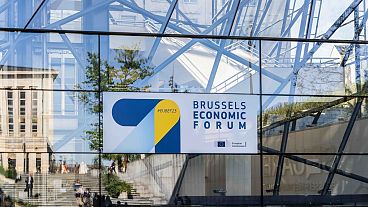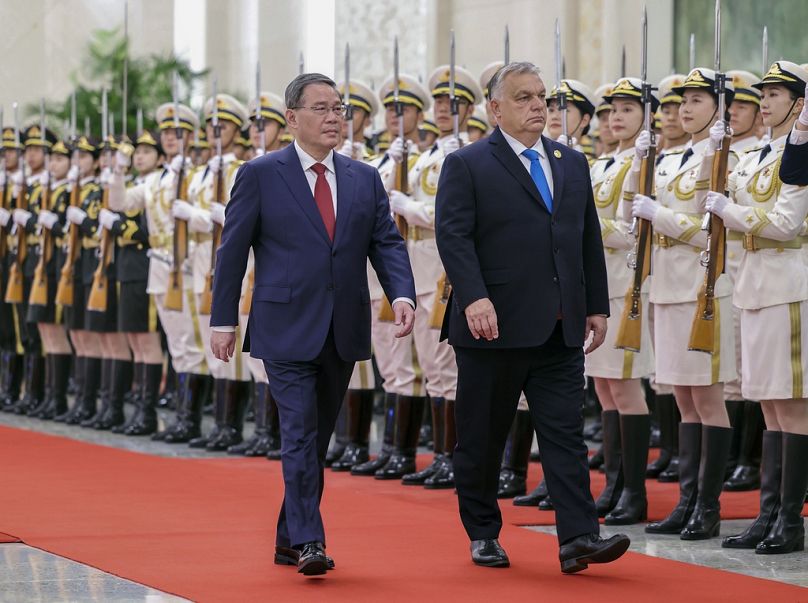We think that our vision of connectivity is essential for Europe’s ability to become strong again — and that cooler heads will soon have a chance to prevail. During our presidency, we intend to show how, Balázs Orbán writes.
Chinese President Xi Jinping’s trip to Europe this week is his first visit to the continent since the COVID-19 pandemic. The pandemic disrupted exchanges between Europe and China, making President Xi’s visit crucial in restoring links with European countries.
The first visit of a Chinese president in 20 years to Hungary also marks the 75th anniversary of the establishment of diplomatic ties between Hungary and China.
One might find it curious why Budapest has emerged as the only EU capital President Xi is visiting other than Paris.
The simple answer is that Hungary has transformed into a pivotal state for all concerned — a promoter of peace and national sovereignty, a leader of new industries, a crucial player in bridging East and West, and a gateway to the European Union. The Chinese president’s choice reflects this fact.
This is what we mean by 'Hussar Cut'
Hungary's foreign policy strategy, centred on connectivity, is attracting global attention.
While many nations across the world are closing in on themselves, Hungary stands out by actively cultivating ties with a wide array of countries and market players across various sectors, from trade to infrastructure, as well as cultural and scientific exchange.
We believe that this strategy is essential for escaping the middle-income trap and positioning ourselves to thrive in an increasingly complex geopolitical landscape.
This bold masterstroke, a "Hussar Cut" as we call it in Hungarian, appears to be paying off. Since 2010, the Hungarian government has transformed the economy into an open, export-oriented model capable of robust growth.
This has resulted in a remarkable 38% increase in GDP per capita over the past 13 years.
Our efforts have propelled Hungary from the 23rd to the 11th most complex economy according to the Harvard Economic Complexity Index, boasting a highly diversified export portfolio.
Additionally, we've fostered a work-based society with record-low unemployment, complemented by a flat-rate income tax of 15% and a corporate tax rate of just 9%.
It's all about best technology, globally
Hungary has been focused on bolstering domestic companies such as MOL, Richter, OTP Bank, and 4iG to help them emerge as dominant regional players.
Our efforts to expand energy connections, repurchase the Budapest Airport, renovate the Budapest-Belgrade railway and establish a port in Trieste capable of handling 2.5 million tonnes of goods a year further our commitment to enhanced connectivity across all fronts.
Foreign Direct Investment (FDI) in Hungary has nearly doubled since 2010, with a more geographically diverse investor base. Last year, compared to 2010, the share of Asian investors surged from 19% to 34%. Meanwhile, European investments accounted for 56%.
We actively encourage foreign companies to establish headquarters here, as we aim to make Hungary a regional hub and a global meeting point. Alongside this, we invest significantly in culture and sport relative to GDP, outstripping European averages.
On the industrial front, Hungary seeks to strengthen its military, information technology, energy, and banking sectors while also emphasising the development of industries such as food, pharmaceuticals, and automotive — all pivotal for global connectivity.
As part of our strategy, we seek to partner with countries and companies that offer the best technology globally, which is why China is a natural partner for us. Hungary’s strength is growing, particularly in the electric vehicle sector.
BYD, China’s top electric vehicle manufacturer, has announced plans to build its first European passenger car facility in Hungary, which is a direct result of building strategic partnerships over the years. In doing so, we’re betting against the current trends toward decoupling and de-risking.
Europe’s place in this increased global competition is under threat. In recent years, European GDP growth has lagged in both the Us and China. Europe’s import dependency is five times higher than that of the North American continent, according to the Hungarian Institute of International Affairs, and decoupling would come at a very high cost.
Keep cool, calm and connected
In this situation, Europe must also recognise that the evolving geopolitical environment requires a strategy of prudent connectivity. When global tensions between China and the US arise, Europe’s open economic framework will pay the price.
The increasing logic of bloc formation we witness today poses a number of clear dangers.
From our perspective in Budapest, these dangers include the worsening of existing dependences, the loss of our sovereignty, economic decline, consignment to the geopolitical periphery, and exposure to conflicts affecting all bloc members.
Our proposed solution is for Hungary to become a keystone state — a pivotal hub in the interconnected global landscape. By doing so, we can mitigate one-way dependencies, safeguard our sovereignty, ensure economic prosperity, and maintain internal and external security.
Doing so is crucial not only for our sovereignty but also for the success of the region and of Europe as a whole.
In the second half of this year, Hungary will exercise the rotating presidency of the Council of the EU.
We think that our vision of connectivity is essential for Europe’s ability to become strong again — and that cooler heads will soon have a chance to prevail. During our presidency, we intend to show how.
It’s time to take a step back from the brink of a divided world. In Hungary, we are already reaping the benefits.
Balázs Orbán is a member of the Hungarian parliament and political director for Prime Minister Viktor Orbán.
At Euronews, we believe all views matter. Contact us at view@euronews.com to send pitches or submissions and be part of the conversation.




